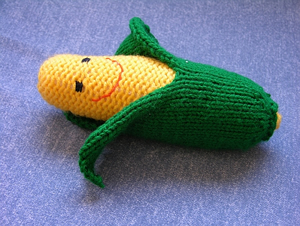November 12th, 2008 by Dr. Val Jones in Audio, Expert Interviews
1 Comment »
Penny Kris-Etherton, Ph.D., R.D., Distinguished Professor of Nutrition (Department of Nutritional Sciences, Penn State University) about what she learned at the American Dietetic Association Food & Nutrition Conference & Expo in Chicago.
Please listen to the podcast here: [audio:http://blog.getbetterhealth.com/wp-content/uploads/2008/11/pennykrisetherton.mp3]
Penny’s take home messages:
1. Corn is not evil. The vegetable itself can be quite nutritious, though high fructose corn syrup is an empty calorie food additive.
2. There is no magic food that will melt your fat away.
3. There is no magic pill that will help you lose weight. You must decrease your calorie intake and increase your exercise.
4. Increasing protein a little bit can increase satiety.
5. Omega-3 fatty acids and iron can improve brain health.
6. Regular fatty fish consumption can reduce the risk of heart disease (2 servings/week).
7. Food first – try to get all your nutrients from the foods you consume. Consider vitamins and supplements only after you’ve been unable to get your dietary needs met from food.
8. Fish oil supplements are safe and pure. There are differences in the amount of omega-3 fatty acids that the supplements deliver, so read the label carefully.
9. A healthy diet is about eating a broad range of nutritious food (don’t scrimp on your veggies), it’s not about supplementing a poor diet with some supplements.
10. Accurate nutrition information is really important. Two trusted sources are: MyPyramid.gov and the American Heart Association
**Listen to the podcast**
November 11th, 2008 by Dr. Val Jones in Health Tips
5 Comments »
Several people have asked me if corn syrup is the root of all evil. This cheap, high calorie sweetener is adding hidden calories to everything from spaghetti sauce to condiments to peanut butter. But is it actually worse for you than “regular” cane sugar? Is there something special about corn syrup that makes it worthy of national vilification?
The truth is that corn syrup isn’t any “worse” than any other highly refined sugar – there’s nothing special about corn that makes it harmful to consume (unless maybe if you’re allergic to corn, but that’s another story). The real issue is that we humans love sweet things, and that food product manufacturers are simply adding sweetener to their products to cater to our taste buds. In so doing, hidden calories add up… and waist lines expand in response.
Folks with diabetes understand how difficult it is to find unsweetened products these days, and they have to work extra hard to avoid the high fructose corn syrup in so many foods. For those of us who don’t have diabetes (yet?) we’d probably do well to follow their example and consciously cut down on our sugar intake if not to manage our insulin levels, but at least to avoid unnecessary calorie consumption.
I myself am a bit of a sugar addict by nature – I resolved to cut down on carbs a few months ago and have dropped 10 pounds already. I have learned to like unsweetened almond milk, unsweetened organic ketchup, and I make my own sauces and avoid refined flour products.
In my next post I’ll speak with Penny M. Kris-Etherton, Ph.D., R.D., Distinguished Professor of Nutrition, Penn State University about what she learned at the recent American Dietetic Association Food & Nutrition Conference & Expo (FNCE) in Chicago. She’ll explain why all the fear mongering about corn is a bit exaggerated.












